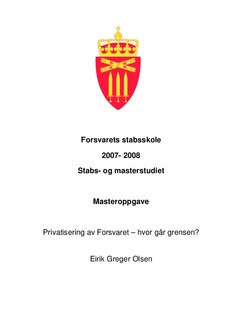| dc.description.abstract | The object of this study is to identify, describe and explain different factors that may affect the level of privatisation in the Norwegian Armed Forces. In order to do that, I have developed a model by combining two theoretical perspectives. The basis of the model is Carl von Clausewitz’ triad of State, People and Defence. The State sets the goals for the Defence to achieve, the Defence develops suitable capacities and the People provide the necessary will. This triad symbolises the national dimension. The national dimension, however, is affected by external, international forces. For this purpose I have used the works of Robert D. Putnam. In his article ”Diplomacy and Domestic Politics: The Logic of Two-Level Games” he argues that international politics is a two-level game. On the national level different groups will try to promote their own agendas by lobbying the politicians, whilst the politicians on their part will seek power by constructing coalitions amongst these groups. On the international level, national governments will try to maximise their abilities to satisfy domestic demands, and at the same time try to minimise the negative consequences of international developments. It is highly likely that international trends such as the Revolution in military affairs, the changing character of war and the reform of public sectors through New Public Management, have an impact on the level of privatisation of the Norwegian armed forces. However, on the national level the following factors stand out as most significant: First the political determination to privatise military support functions in order to save money and focus on operational core tasks, such as international operations. Second, the number and complexity of tasks that the Defence is expected to handle, combined with limited funding, opens up for burden sharing. Third, the ongoing transformation of the Defence into a smaller, more professional and technological demanding organization, makes it more reliant on private expertise and support. Fourth, the reform of public sector in Norway, combined with the absence of an imminent and plausible threat to national security, opens up for more out sourcing. On the other hand, traditions for a strong State, support of international law and humanitarian values, as well as public scrutiny of the armed forces through media, hampers the will and ability to privatise anything that may be linked to combat operations or the use of arms. Privatisation of support functions seem to be accepted and encouraged, both by the government and the public, but not military core functions. | en_US |
